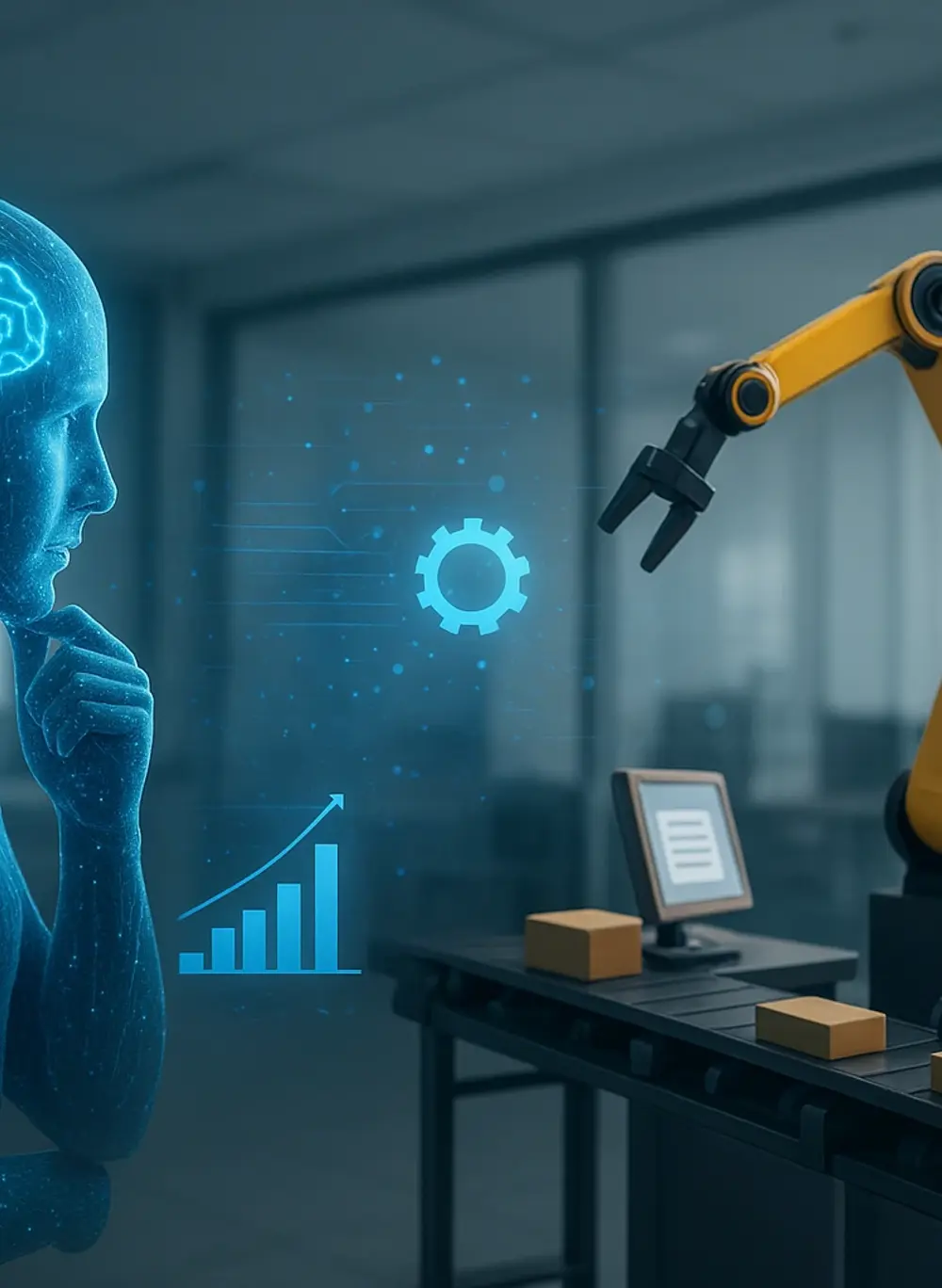Artificial Intelligence is longer just a concept of future technology, it’s a practical tool that is changing how businesses operate across all areas. From automating routine tasks to providing insights that inform better decisions, AI is helping organisations work more efficiently, reduce costs and improve experiences for both employees and customers.
Across industries, businesses are recognising that AI is no longer just a nice-to-have but is becoming as essential part of staying competitive and up to date. In this blogpost, we look at five use cases of AI across five key business departments, including HR, Operations, Finance, Marketing and Sales, and show how organisations can make practical use of AI today.
AI In Human Resources (HR)
HR teams are increasingly leveraging AI to improve talent management, employee engagement and workforce efficiency. Here are five examples:
1. Recruitment and Talent Acquisition
AI-powered tools can screen CVs, analyse candidate profiles, and match them to job requirements more quickly than traditional methods, helping reduce time-to-hire. These tools can also identify candidates with transferable skills, widening the talent pool and promoting diversity.
2. Employee Engagement and Retention
Sentiment analysis of surveys and internal communications enables HR to better understand employee morale and address issues before they escalate. This proactive approach helps organisations retain valuable staff and maintain a positive workplace culture.
3. Onboarding Automation
AI chatbots can guide new employees through induction processes, paperwork, and training schedules, ensuring they settle in smoothly. They also provide instant answers to common questions, freeing HR teams to focus on more complex support.
4. Performance Management
Continuous feedback platforms use AI to monitor employee performance, highlight achievements, and suggest development opportunities. This allows managers to provide more timely and personalised support, improving overall team productivity.
5. Training and Upskilling
AI-driven learning platforms can tailor training programmes to individual employees’ roles, experience levels, and learning preferences. By identifying skill gaps and recommending targeted courses, these platforms help staff develop in ways that benefit both them and the organisation.
AI in Operations
Operations teams are increasingly turning to AI to streamline processes, cut costs, and maintain high standards of quality. Here are some key ways AI is being used:
1. Process Optimisation
AI can analyse workflows to predict bottlenecks and suggest improvements, helping teams work more efficiently. By highlighting inefficiencies early, organisations can reduce delays and make better use of resources.
2. Supply Chain Management
Machine learning algorithms can forecast demand, optimise stock levels, and flag potential supply chain risks. This allows businesses to plan more accurately, minimise waste, and respond quickly to market changes.
3. Quality Control
AI-powered vision systems can inspect products for defects faster and more consistently than manual checks. This not only improves product quality but also reduces costly returns and wastage.
4. Logistics and Route Planning
AI can assess traffic, weather, and delivery constraints to recommend the most efficient routes for drivers. This helps lower fuel costs, improve delivery times, and reduce the carbon footprint of logistics operations.
5. Operational Risk Management
Predictive analytics can identify potential risks and operational bottlenecks before they become serious issues. By acting proactively, organisations can avoid costly disruptions and maintain smooth day-to-day operations.
AI in Finance
Finance teams are increasingly using AI to improve accuracy, manage risk, and streamline operations. Key use cases include:
1. Fraud Detection and Prevention
AI can analyse transactions in real time to spot unusual activity, helping prevent financial losses. It also adapts to emerging fraud patterns, making detection more reliable over time.
2. Financial Forecasting
Machine learning models can predict revenue, expenses and cash flow trends with greater accuracy than traditional methods. This enables businesses to plan budgets more effectively and make informed strategic decisions.
3. Automated Accounting and Reconciliation
AI can handle repetitive tasks such as invoice processing, ledger updates and reconciliation, reducing the risk of human error. This frees up finance teams to focus on higher-value work like analysis and strategy.
4. Expense Management
AI can monitor spending patterns, flag unusual transactions and ensure compliance with company policies. This helps organisations control costs and maintain financial discipline.
5. Risk Assessment and Compliance
AI tools can assess regulatory requirements, monitor risk exposure and support reporting. By identifying potential issues early, companies can avoid fines and improve overall governance.
AI in Marketing
Marketing teams are using AI to better understand customers, personalise communications, and improve campaign performance. These are some of the ways it is being used:
1. Customer Segmentation and Personalisation
AI can analyse customer data to create highly targeted segments and deliver personalised messaging. This increases engagement and ensures marketing efforts are more relevant.
2. Predictive Campaign Performance
Machine learning models can forecast which campaigns are likely to perform best, helping teams allocate budgets more effectively. This improves ROI and reduces wasted budgets.
3. Chatbots and Conversational AI
AI-powered chatbots can respond to customer enquiries instantly, providing support outside of normal office hours. They also help qualify leads and guide potential customers through the buying journey.
4. Content Generation and Recommendation
AI tools can assist in creating marketing copy, social media posts and product descriptions, as well as recommending content to individual users. This improves efficiency and ensures the right content reaches the right audience.
5. Social Media Monitoring and Sentiment Analysis
AI can track brand mentions and analyse public sentiment across social platforms. This allows marketing teams to respond quickly to trends, assess brand reputation and measure campaign impact.
AI in Sales
Sales teams are using AI to identify opportunities, improve forecasting, and close deals more efficiently. AI can be applied in sales such as:
Lead Scoring and Prioritisation
AI can evaluate leads based on historical data and behaviour, helping sales teams focus on prospects most likely to convert. This increases efficiency and improves conversion rates.
2. Sales Forecasting
Machine learning can predict future sales trends by analysing patterns, seasonality and customer behaviour. This supports better planning and more realistic target setting.
3. AI-Powered CRM Insights
AI can analyse CRM data to recommend next steps, highlight opportunities and identify at-risk accounts. This enables sales teams to act proactively rather than reactively.
4. Dynamic Pricing and Promotions
AI can adjust pricing and offers in real time based on demand, competition and customer behaviour. This helps maximise revenue while staying competitive.
5. Customer Behaviour Analytics
AI can identify patterns in customer interactions and buying behaviour, allowing sales teams to tailor approaches for individual clients. This improves engagement and increases the likelihood of successful deals.
Final Thoughts
AI is no longer just a tool for experts and technical teams, it is increasingly shaping the way every part of a business operates. Organisations that integrate AI across its departments such as HR, Operations, Finance, Marketing and Sales can gain a real competitive advantage by automating routine tasks, reducing errors and uncovering actionable insights. Using AI in business departments and company-wide also helps to deliver more personalised experiences for both employees and customers.
Adopting AI is about more than simply improving efficiency it also enables smarter decision-making, better resource allocation, and the identification of new growth opportunities. While introducing AI comes with challenges, these can be successfully managed with careful planning and the right approach. Artificial intelligence is steadily becoming an important part of how businesses run, helping teams work more efficiently, make smarter decisions and overcome operational challenges along the way.
Ready to explore AI for your business? If you’re unsure where to start, we offer a free 90-minute workshop to show how AI and automation can work for your organisation. Register your interest here.




